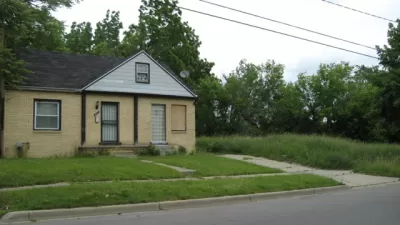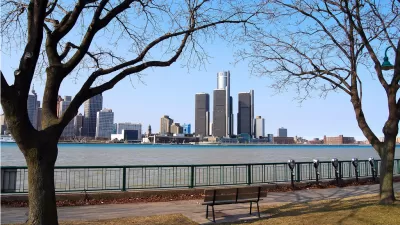After two years of work, hundreds of meetings, and 70,000 survey responses and comments from participants, Detroit will today release the strategic framework plan that will guide the city's long-term recovery, reports Leonard N. Fleming.
The plan, which began in 2010 under the auspices of the Detroit Works project, and is now being called Detroit Future City, is oriented around five key elements - economic growth, land use, city systems, neighborhoods and land and building assets. According to Fleming, it "involves everything from creatively reusing large swaths of empty land and expanded public transportation to supporting local businesses and finding ways to help foster economic growth."
One of the primary challenges for the authors of the plan was how to reconcile a shrinking population of about 700,000 with an infrastructure and environment built to support a population that reached nearly 2 million in 1950.
"Organizers said parts of the plan could take up to 50 years to implement, but other changes intended to stabilize neighborhoods could happen sooner. Residents living in less densely populated areas, for example, would not be required to leave but could expect natural areas and hiking trails built around them in years to come. And in some areas where services are more prevalent, rezoning efforts could lead to business growth in areas that are now considered residential." As Fleming notes, the city would also provide incentives to encourage residents to move into more populated areas.
"Organizers said they wanted to build a "framework for decision-making" with specific goals in the first five years to stabilize the city through more reliable services, improve the city through 2020 with economic growth, sustain Detroit through 2030 with a more stabilized population and an increase in jobs, and by 2050, transform it into a premier city."
FULL STORY: Long-term Detroit neighborhood stabilization plan to be unveiled

Alabama: Trump Terminates Settlements for Black Communities Harmed By Raw Sewage
Trump deemed the landmark civil rights agreement “illegal DEI and environmental justice policy.”

Study: Maui’s Plan to Convert Vacation Rentals to Long-Term Housing Could Cause Nearly $1 Billion Economic Loss
The plan would reduce visitor accommodation by 25% resulting in 1,900 jobs lost.

Planetizen Federal Action Tracker
A weekly monitor of how Trump’s orders and actions are impacting planners and planning in America.

Wind Energy on the Rise Despite Federal Policy Reversal
The Trump administration is revoking federal support for renewable energy, but demand for new projects continues unabated.

Passengers Flock to Caltrain After Electrification
The new electric trains are running faster and more reliably, leading to strong ridership growth on the Bay Area rail system.

Texas Churches Rally Behind ‘Yes in God’s Back Yard’ Legislation
Religious leaders want the state to reduce zoning regulations to streamline leasing church-owned land to housing developers.
Urban Design for Planners 1: Software Tools
This six-course series explores essential urban design concepts using open source software and equips planners with the tools they need to participate fully in the urban design process.
Planning for Universal Design
Learn the tools for implementing Universal Design in planning regulations.
Caltrans
Smith Gee Studio
Institute for Housing and Urban Development Studies (IHS)
City of Grandview
Harvard GSD Executive Education
Toledo-Lucas County Plan Commissions
Salt Lake City
NYU Wagner Graduate School of Public Service





























